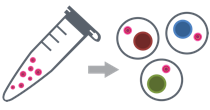Single-Cell RNA-Seq
Single-cell RNA sequencing (single-cell RNA-Seq or scRNA-Seq) is a technique that provides transcriptional profiling of thousands of individual cells to uncover transcriptome diversity in heterogeneous cell populations. Due to advances in microfluidics and molecular barcoding, transcriptional profiling of individual cells is cost-effective and easy to interpret. This level of throughput analysis enables you to understand at the single-cell level which genes are expressed, in what quantities, and how they differ within your sample.
As an early adopter of the 10x Genomics® Chromium™ and Illumina® NovaSeq™ 6000, our optimized workflows for single-cell RNA-Seq, including pre-submission cryopreservation and post-submission dead cell removal, maximize project flexibility, speed, and data accuracy.
For bulk expression analysis of samples with picograms of RNA or just a few cells, use our ultra-low input RNA-Seq service. Unsure which service is the right fit for your research goals? Browse our frequently asked questions (FAQs).
What is the difference between RNA-Seq and scRNA-Seq?
RNA sequencing (RNA-Seq) is used to measure average gene expression levels in a bulk population of cells by extracting and sequencing RNA from cell populations. ScRNA-Seq) is used to analyze gene expression at the single-cell level by sequencing the whole transcriptome of an individual cell.
How does scRNA-Seq work?
ScRNA-Seq works by isolating cells into individual compartments for construction of barcoded libraries prior to sequencing. The sequencing data is parsed according to the cell-specific barcodes and analyzed.
Single-Cell RNA-Seq Workflow
1. Cell Partitioning
Cells and barcoded beads are isolated in oil droplets using the 10x Genomics Chromium
2. Library Preparation
Reverse transcription incorporates cell- and transcript-specific barcodes
3. Sequencing
Barcoded libraries are pooled and sequenced on the Illumina platform
4. Data Analysis
Receive custom analysis and visualize results through interactive software
scRNA-Seq Features & Benefits
scRNA-Seq Technical Resources

Webinar Series | Advancing Transcriptomics: Gene Expression Screening, Single-Cell RNA-Seq, and Beyond
With this two-part webinar series, go beyond traditional transcriptomics and learn about the various NGS approaches available for gene expression analysis. In part 1, we take an in-depth look at various gene expression approaches, including RNA-Seq, single-cell RNA-Seq, digital spatial profiling, and more. In part 2, we explore the data generated from these approaches and how they can complement each other and confirm findings.
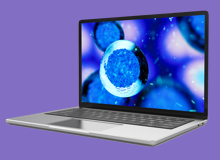
Webinar: Improving Single-Cell RNA-Seq Workflow Efficiency to Scale Clinical Research
In this webinar co-hosted by GENEWIZ from Azenta and 10x Genomics, learn how Clinical Research Organizations (CROs) provide expertise across the single-cell RNA sequencing (scRNA-Seq) workflow, including sample prep and experimental execution. This enables pharmaceutical and biotech clients to perform single-cell analysis at greater scale, efficiency, and reproducibility for clinical research.
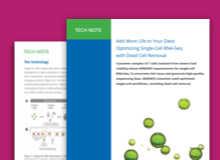
Tech Note: Add More Life to Your Data: Optimizing Single-Cell RNA-Seq with Dead Cell Removal
Obtaining samples with high cell viability can be difficult for many experiments but is necessary for success on the 10x Genomics® Chromium™ platform. This tech note describes how GENEWIZ scientists used optimized single-cell workflows, including dead cell removal, to overcome low viability and generate high-quality sequencing data.
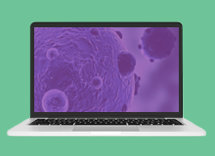
Webinar: Advancements to the 10x Genomics Chromium™, Single-Cell RNA-Seq System
In this webinar, we review how recent advancements of the 10x Genomics Chromium™ system, coupled with GENEWIZ developmental efforts, can benefit the researcher. In addition, we spotlight our new Single-Cell V(D)J Solution, which can be used in conjunction with single-cell transcriptome profiling to identify pairing of full-length BCR and TCR sequences.
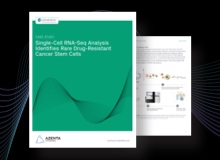
Case Study: Single-Cell RNA-Seq Analysis Identifies Rare Drug-Resistant Cancer Stem Cells
Cell populations are rarely homogeneous and synchronized in their characteristics. Standard RNA-Seq approaches are limited to reporting general expression levels thus omitting minor subpopulation profiles. This study highlights new single-cell RNA sequencing capabilities for identifying rare cells, characterizing their transcriptomes, and discovering potential biomarkers.
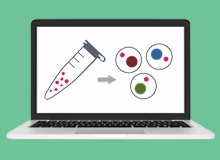
Presentation: Optimized Workflows for Single-Cell RNA-Seq
Learn how the GENEWIZ single-cell workflows help customers more easily prepare samples and achieve the highest quality results from their sequencing projects. With our methods for cryopreservation and dead cell removal, we provide flexibility and convenience to scientists. This presentation was featured at the Deep Sequencing Forum 2018.

Poster: Highly Multiplexed Single-Cell Transcriptome and Epigenome Profiling of Cryopreserved Tissue Enables Multi-Omic Tissue Characterization in Clinical Settings
Single-cell analysis typically relies upon immediate processing of fresh tissue, presenting limitations for translational and clinical applications. Learn how the GENEWIZ robust cryopreservation workflow for downstream processing enabled high-quality, single-cell transcriptomic and epigenomic analysis of translational and clinical samples by coupling scATAC-seq and scRNA-seq.

Top 3 Factors to Consider Before Starting a Single-Cell Sequencing Project
With several commercial platforms available, high-throughput single-cell sequencing is now more accessible than ever. In this article, we’ll touch upon the 3 most important factors to consider before embarking on your single-cell project to ensure you select the right NGS approach for your research.

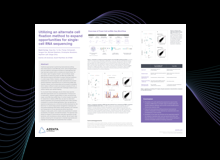
Poster | Utilizing an alternate cell fixation method to expand opportunities for single-cell RNA sequencing
The complexity of sample preparation for single-cell sequencing remains a bottleneck for researchers interested in performing analysis at the cellular level. In this poster, we highlight an alternative sample preparation and processing workflow to standard methods that help to broaden the usage of single-cell sequencing approaches.
NGS Platforms
For information on our NGS platforms as well as recommended configurations of your projects, please visit the NGS Platforms page. GENEWIZ from Azenta does not guarantee data output or quality for sequencing-only projects.





